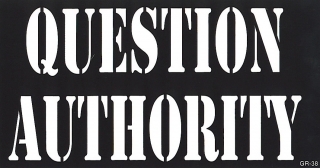Caveat Emptor

In 1961 Stanley Milgram conducted his famous experiment. Subjects were led to believe that they were "teachers" and were administering shocks to other volunteers ("learners" — some with heart conditions) for each wrong answer in a memory test. As the test progressed the voltage was gradually increased to 450 volts, and with each increase the "learners" would protest more and more loudly, pounding on walls and screaming in pain. At the same time, the experimenter would urge the "teacher" to continue. Depending on how far the "teacher" was willing to go, the "learner" would eventually stop responding.
But there were no shocks (except very mild ones that the subjects were given as a sample.) It was all an elaborately scripted charade to test the subject's willingness to obey an authority figure (the experimenter). Even the experimenter's urging to continue was carefully crafted and the very language he used was part of the test.
65% of the subjects were willing to go all the way to 450 volts, despite the violent protests of the actors playing the "learners." (The Wikipedia article on this is pretty good, and if you google "Milgram Experiment" there are many other excellent resources on Milgram's work.)
This experiment is cited pretty often by dog trainers as an explanation as to why some people are willing to use harsh techniques on their dogs. When shown something by an "authority figure," the unreasonable can seem quite reasonable. And since the Milgram Experiment centered around a simulation of some pretty severe punishment, the parallels to harsh and coercive techniques (not to mention shock) are almost inescapable.
But you don't have to be looking at the working end of a remote control or a training collar for the Milgram experiment to be apropos: "The disappearance of a sense of responsibility is the most far-reaching consequence of submission to authority." - Stanley Milgram
All it takes is a feeling that you are not responsible. It's very easy to acquiesce because you feel the "authority" in front of you is more knowledgeable, more experienced, or more skilled than you are.
Don't do that. It's bad.
Whether you are holding a leash, brandishing a clicker, or just reading a blog post, don't stop thinking for yourself. Don't cop out and convince yourself that are not responsible for your actions or beliefs because someone - anyone, said so. Check their work. Think things through. If what you are being told sounds silly, unbelievable, ineffective, or cruel, don't buy it. Get more information: ask for it. If you get evasive or repetitive answers, move on to someone else. The reaction to a simple request for more information can be a good "truth test."
This advice doesn't just apply to techniques that seem harsh by the way. There's plenty of bad advice available online and in classrooms on both ends of the spectrum. The advice that leads to harsh techniques are more viscerally upsetting, but dogs that were gently not-trained end up in shelters too. (There's a reason spectrums have "ends." Because there's no more progress once you get to them.)
Let's face it, new-age horse manure and crap science from people that get their info from free abstracts and USA Today (Science Times uses too many big words) is available from all quarters, it's not confined to one type of training or another.
Milgram's research was driven by a desire to understand why people react to authority the way they do. Of course the authority he was concerned about was government authority - he was largely influenced by the Holocaust, a very recent memory for his family and the people he grew up around in New York City in the 30's and 40s.
But there are other types of authorities. As a matter of fact, you can learn how to become an authority from books and "being an authority" is considered key to becoming a successful blogger, (at least by the folks that claim they can make money from blogging. I often question their authority on that one.)
I think authority is a scary word. Not because I'm intimidated by authority, but because I am afraid of how easy it is to become considered one.
- Declare yourself an authority.
- Repeat your claim.
- Repeat step #2 until people believe you, or catch on that you're full of crap.
You can see this in action anywhere, it's certainly not confined to politics, where it is most visible, or dog training, which is what we happen to be talking about.
Dog training is a scientific endeavor — or at least it is when it is being done right and the people doing the training understand what they are doing.
Scientific (adj): based on or characterized by the methods and principles of science
Science (noun) : a systematically organized body of knowledge on a particular subject.
The state of "a systematically organized body of knowledge" is driven by a process. The "science" changes over time and we're really lucky right now — "our species" is being study more closely and widely than ever before. (Shameless plug: check out the new IAABC podcast this week for an interview with Brian Hare from the Duke Canine Cognition Center that touches on this topic.) As a result there is a lot of new information out there.
The body of knowledge is what is authoritative, not the people. But it can change too, and what's really great about a body of knowledge is it lacks an ego and is capable of real change.
Like many things, "the science" can seem like a pendulum, swinging from one extreme to another. But there's always a rhyme and reason to it, and there's a reason we swing from one extreme to another.
Because should we spending most of our time in the middle, getting to the business of training dogs.




